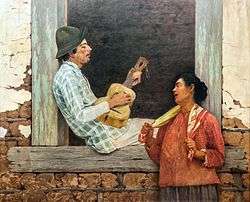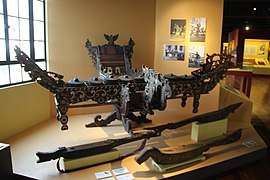Folk instrument
A folk instrument is a musical instrument that developed among common people and usually does not have a known inventor. It can be made from wood, metal or other material. Such an instrument is played in performances of folk music.

The viola caipira is a Brazilian folk instrument.
Overview

The kulintang is a popular and religious musical instrument in many ethnic societies in eastern islands of maritime Southeast Asia.
The instruments can be percussion instruments, or different types of flutes or trumpets, or string instruments that are plucked, hammered or use a form of bow.[1]
Some instruments are referred to as folk instruments because they commonly appear in folk music, even though they do not meet the criteria defining a folk instrument; an example is the harmonica.
List of folk instruments
- accordion
- alboka
- appalachian dulcimer
- autoharp
- bagpipe
- balalaika
- bandura
- banjo
- bağlama
- binioù kozh
- birimbau
- bodhrán
- bombard
- bouzouki & Irish bouzouki
- brommtopp
- bukkehorn
- bullroarer
- cajón
- catá
- cavaquinho
- Celtic harp
- chajchas
- charango
- çığırtma
- çifteli
- cimbalom
- claves
- concertina
- cuatro
- daegeum
- darbuka
- didgeridoo
- dhol
- djembe
- dholak
- dingulator
- damphu
- dotara
- dranyen
- drum
- ektara
- erhu
- fiddle
- fujara
- gadulka
- gaida
- gayageum
- gudok
- guitar
- guitarra Portuguesa
- guitalin
- gusle
- gusli
- haegeum
- hank drum
- hardingfele
- harmonica
- harmonium
- hammered dulcimer
- hurdy-gurdy
- jaw harp
- jouhikko
- jug
- kazoo
- kantele
- kaval
- khamak
- klopotec
- kobza
- komuz
- kora
- kulintang
- launeddas
- låtfiol
- lur
- lute
- madal
- mandola
- mandocello
- mandolin & octave mandolin
- marimbula
- mbira/thumb piano
- melodeon
- mridangam
- mountain dulcimer
- musical saw
- nyckelharpa
- ocarina
- pan flute
- pipa
- pogo cello
- quena
- phamuk
- rabeca
- rebab
- rebec
- recorder
- ravanahatha
- rubab
- salamiyyah
- shofar
- sinfonia
- sitar
- snare drum
- smallpipes
- Sarangi (Nepali)
- Sarangi (Indian)
- sopilka
- spilåpipa
- Steel Guitar
- steelpan
- stompbox
- tabla
- talking drum
- tin whistle
- tambura
- tiple
- trembita
- tres
- oud
- ocarina
- udu
- uilleann pipes
- ukulele
- viola beiroa
- viola braguesa
- viola caipira
- viola campaniça
- viola da terra
- viola toeira
- violin
- vuvuzela
- washboard
- washtub bass
- willow flute
- xylophone
- yangqin
- zampoña
- zurna
- zither
- zhaleika
gollark: Are you implying that Lisps and provers aren't languages?
gollark: "the two languages will be left by themselves"
gollark: I think you're right. Oh dear.
gollark: It doesn't matter to a simple family tree diagram.
gollark: Er, pretend it says 5 for that last one...
References
- "Chapter 9" (PDF). Retrieved 16 February 2020.
This article is issued from Wikipedia. The text is licensed under Creative Commons - Attribution - Sharealike. Additional terms may apply for the media files.